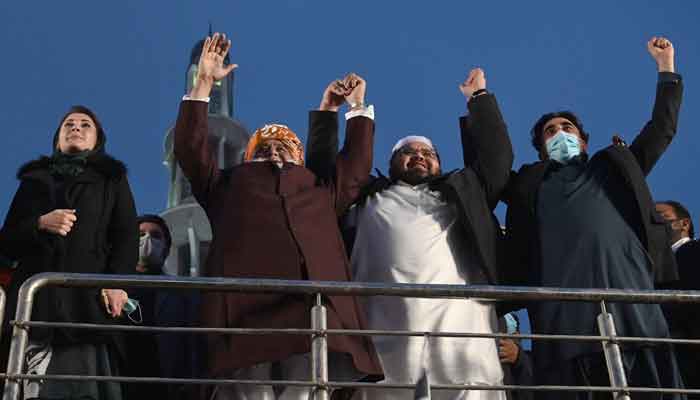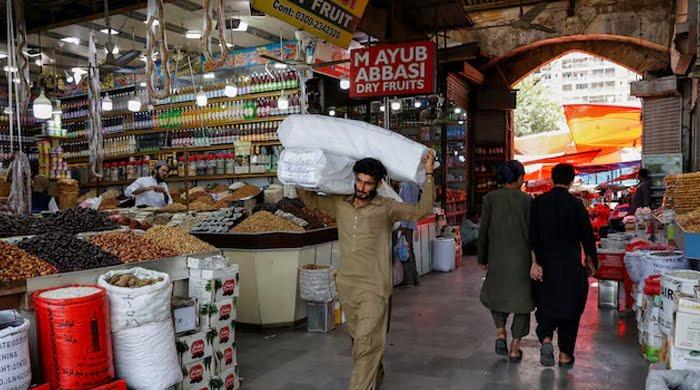Pakistan's political parties and their priorities
Today, we have a system where there is really no difference in ideology between the various parties
October 14, 2022

Our current discourse in the political arena revolves essentially around corruption, various court cases related to this or to contempt of different kinds, and most lately, the audio leaks that have been emanating apparently from the PM Office.
Of course, corruption is important. Of course, we all deserve a nation which is not run by corrupt politicians interested only in their own welfare and not in that of the people they are elected to serve. But that is not the only issue on their agenda and ahead of a new general election within the coming months we need a clear-cut idea of what the parties are willing to offer and what their plans are.
In the first place, no party has come forward with an agenda that puts the people ahead of everything else. They deserve to be far higher on the priority list. This would mean offering them quality education in public-sector schools, so they are not forced to turn to madrassahs or to private schools which rip off parents in many cases and offer little in terms of quality education. We also need a healthcare service system which actually serves people rather than simply exploiting them or leaving them to wait for hours outside clinics or to see doctors. Even the so-called ‘better government hospitals’ feature up to three or four patients forced onto a single bed with their attendants hovering around in crowded, cramped, and completely inadequate wards.
We also need a social welfare system of some kind, which can sustain people in this time of acute poverty and deprivation. The reports about an increase in street crime and possibly in the abduction of children in order to sell them or to perhaps hold them for ransom are disturbing. There is no confirmation of these reports which flood social media but it is possible that people will resort to desperate measures when they have no other means to live. Those means have to be provided through a working welfare system which can cater to the needs of people, particularly in these post-Covid times when floods have created further devastation and destruction across the country. The floods mean there is still more disease, still more poverty and a very real danger of major food insecurity in the future if farmers are unable to plant their crops or follow the usual pattern of agricultural production.
Unfortunately, none of our parties have an agenda which focuses on any of this. Indeed, since the 1970s, we have not seen any party offer anything which is essentially pro-people rather than centred on individuals and on the concerns of individual leaders. Simply the tradition of handing over parties from a parent to a child, as happened in the case of the PPP, and can also be seen within the PML-N, is an example of how little political leaders really care about what their parties are doing, and are focused essentially only on holding on to power. Till the 1970s, the PPP, as a centre-left party, had offered some hope with its slogan of ‘roti, kapra aur makaan’. Since then, it has faltered even on this, and of course, Zulfikar Ali Bhutto failed to deliver on his promises, unable to carry out the landforms planned in the country, in particular ignoring Sindh which has the largest land holdings and the most vested feudal interest.
Today, we have a system where there is really no difference in ideology between the various parties. The differences are minor and, in many ways, insignificant. Even the agenda of the JUF-F is not all that different from that of the PTI and the PML-N, and the PPP cannot really be separated in terms of what side of the ideological divide they stand on. This is increasingly true of the world itself. The collapse of the Soviet Union removed the backing that many left-leaning parties felt they needed in order to pursue their vision and push through their particular notions of what should be happening. Today, the Democrats and the Republicans in the US, or Labour and the Tories in the UK are essentially similar in what they offer with only nuances available to distinguish one from the other.
For Pakistan, this is a tragedy. Unlike so many other countries, we have failed in the years to invest in people, and this perhaps is our biggest problem today. Just the fact that 50% of our children are stunted or unable to reach the expected height by age is shocking. It signifies the extent of malnutrition which affects the population, with many families surviving on merely one meager meal a day or even less. The under-five mortality rate is amongst the highest in the world.
Unlike nations such as Malaysia, we have failed to put money into the welfare of people and failed to put their concerns ahead of everything else. As a result, all we have is chaos – with parties now deeply divided and their followers taking the same extreme lines in their attitudes towards where they stand, and what they want. Imran Khan’s attempts to portray himself as a heroic saviour have faltered. There are now multiple stories about what he has been engaged in, taking away from his image of being at the very least an honest man. But it is also true that many of his followers simply do not believe what appears in the press and what they are told. The vast social network built by the PTI, based on traditional media and social media, ensures this in many ways – putting forward story after story about the corruption of the Sharif family and of PPP leaders while ignoring what is happening within the PTI itself. This leaves us in a mess from which it seems difficult to escape.
It is worth looking at the fact that Bangladesh is now well ahead of us in terms of development in so many sectors. It has been able to control population growth, offer education to many more people including girls, control infant and child mortality, and encourage measures of other kinds which empower people. We have failed. This is impossible for many of us to fully accept given the manner in which the then East Pakistan was treated in the days before it became a separate country. But this is not the main point: the main argument is that we need to rethink, we need to develop a new vision, and we need to put people at the top of the political priority list.
Ideally, we need a revolution of some kind. A revolution from the left would, of course, be best of all given what we need. But it is hard to see if it is coming. There is no viable attempt to unite the parties or groups which make up the small leftist factions and parties in the country and bring them together. Had this existed, we may have been in a better place with stronger voices available to at least challenge the narrative that is now put forward again and again by all political parties and coming out stronger now in this time of total division between the major parties in the country.
We need change and we need it quickly. Otherwise, it may be too late for Pakistan and certainly too late for its people with children currently struggling to survive in flood-hit areas across Sindh, southern Punjab, Balochistan and other parts of the country due to the lack of help and assistance they have received from an inept and uncaring government.
Email: [email protected]
The writer is a freelance columnist and former newspaper editor.











